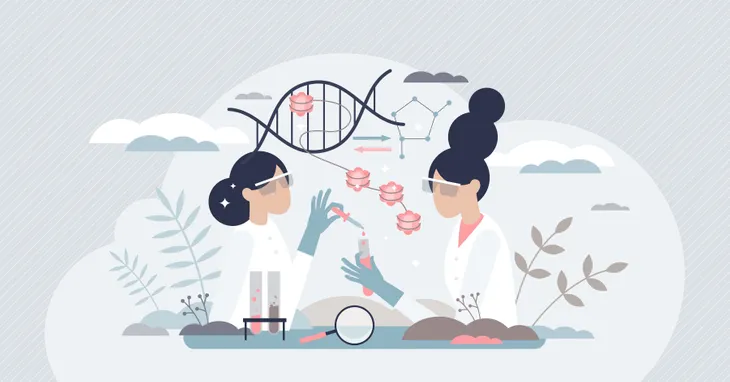- Hereditary angioedema is a rare genetic disorder that causes recurrent episodes of severe swelling.
- Swelling commonly develops in the hands, feet, face, and throat.
- When swelling develops in the throat, it can restrict airflow, resulting in a medical emergency.
- While HAE is incurable, there are treatment strategies available to help you manage the condition.
Hereditary angioedema (HAE) is a rare genetic disorder. According to the National Library of Medicine, the disorder affects roughly 1 in 50,000 people. Even though it’s rare it can cause life-threatening symptoms that warrant an emergency medical visit. This is why it’s important to get informed.
In our full overview of hereditary angioedema, we’ll explore what it is, the signs and symptoms to look out for, and what causes the disorder to develop in the first place. We’ll also look into the possible treatment options and how to manage the disorder. If you or your family is at risk of developing HAE, here’s what you need to know…
What Is Hereditary Angioedema
Hereditary angioedema is a rare genetic disorder that causes recurrent episodes of severe swelling, known as angioedema. Swelling can develop in many areas of the body but the disorder most commonly affects the hands, feet, eyes, lips, or genitals.
In severe cases, swelling can also develop in the lining of the intestinal tract and the lungs which can cause life-threatening complications. Hereditary angioedema is a condition that you’re born with, which means you’ll always have it. That said, there are treatment strategies available that can help you manage the condition, which we’ll get into more detail later.
The Types of Hereditary Angioedema
There are three types of hereditary angioedema (type 1, 2, and 3) and each type “is caused by different genetic mutations,” explains Healthline. Although, they all cause the same reaction in your body which is producing too much bradykinin (a protein that encourages inflammation).
The most common type of HAE is type 1, which makes up roughly 85-percent of all HAE cases. Type 2 HAE is the second most common, accounting for about 15-percent of all cases of HAE. Finally, type 3 HAE is the rarest.
 novak.elcic / Shutterstock
novak.elcic / ShutterstockCommon Symptoms of Hereditary Angioedema
So what happens exactly? The most common symptom of HAE is swelling. Unlike allergic reactions, HAE doesn’t cause itching or hives. Swelling can develop in various parts of the body including the hands, feet, face, genitals, belly, and even your throat.
Furthermore, if you experience swelling in your abdomen, it may induce other symptoms such as extreme pain, nausea, vomiting, or diarrhea. Finally, swelling in your extremities can be painful and make daily tasks difficult.
Early Warning Signs
The National Library of Medicine explains that symptoms of hereditary angioedema typically start in childhood, however, they get worse during puberty. Left untreated, an individual may experience an attack every 1- to 2-weeks, with episodes lasting for 3- to 4-days. All the more reason, to manage the condition.
WebMD notes that you may notice warning signs before the swelling begins, such as:
- Tingling
- Headache
- Extreme fatigue
- Hoarseness
- Mood changes
- Belly pain
- Muscle aches
 9nong / Shutterstock
9nong / ShutterstockWhat Causes Hereditary Angioedema?
Hereditary angioedema is caused by gene mutations, with each type being caused by a different mutation. Both type 1 HAE and type 2 HAE are caused by a mutation in the SERPING1 gene. This mutation causes your body to not produce enough C1 inhibitor which is a protein that limits bradykinin production, explains Healthline. As we mentioned earlier, bradykinin is the protein that encourages inflammation. So, when your body doesn’t produce enough C1 inhibitors, your body will produce too much bradykinin.
Type 3 HAE, on the other hand, is more complicated. Experts don’t always know what causes it, however, they believe some cases are caused by a mutation in the F12 gene. “This gene gives your body instructions for making coagulating factor XI, a protein that plays a part in the production of bradykinin,” explains the source.
Is the Disorder only Inherited?
While hereditary angioedema can certainly be passed on if you have a family history of it, WebMD notes, it can develop for no reason too. That said, the source explains you have a 50-percent chance of developing HAE if one of your parents has the disorder.
The National Library of Medicine also notes that the condition is inherited in an autosomal dominant pattern. This means one copy of the gene mutation in each cell is enough to cause HAE. “Other cases result from new mutations in the gene and occur in people with no history of the disorder in their family,” explains the source.
Identifying Hereditary Angioedema Triggers
Some individuals can identify their triggers, which helps them manage the condition better. That said, it’s not always easy to identify what they are.
Some common triggers include stress, anxiety, and illnesses (such as the flu or common cold). A minor injury or surgery may also trigger HAE attacks, as can certain medications. Some individuals also develop swelling after physical activity such as typing or hammering, says WebMD.
Women may also notice a difference in attacks when they have their period or are pregnant. The source says some women notice fewer attacks while pregnant but then they return after they give birth.
Diagnosing Hereditary Angioedema
If your child develops symptoms of hereditary angioedema or you are concerned about their risk, talk to your doctor. Symptoms of HAE can mimic other conditions such as allergic reactions, so it’s important to get a proper diagnosis.
To diagnose HAE, your doctor will start by reviewing your personal and family history. If they suspect the symptoms are caused by the condition they will likely order blood tests to “check the level of certain proteins in your blood,” explains Healthline. They may also do genetic testing to look for gene mutations.
How Is Hereditary Angioedema Treated?
Unfortunately, there is no cure for hereditary angioedema, however, there are treatment strategies available to help manage the condition. The goals of treatment are to alleviate the symptoms and to reduce the frequency of your attacks.
Type 1, 2, and 3 HAE are treated with prescription medication. The type of medication you need will depend on the type of HAE you have. It’s important to follow the guidance of your doctor for the best treatment plan. In addition to medication, your doctor may also recommend a few lifestyle changes to help manage your triggers and reduce attacks. Let’s take a look at these next!
Lifestyle Changes: Preparing for Events
One way to help prevent hereditary angioedema attacks is by limiting your exposure to triggers. If you have surgery or dental work coming up, inform your doctor. They may prescribe a medication to help reduce your risk of an attack.
Healthline says it’s also important to limit stress and learn coping strategies to relive it. Some stress-relieving strategies may include breathwork, practicing yoga or gentle stretching, reading, or spending quality time with someone you care about.
Finally, if you have HAE and you travel, whether it’s for business or pleasure, it’s important to know where medical care is located. In the event of an emergency, it’s vital that you get medical care immediately, and preparing ahead of your travels can help keep you safe.
Lifestyle Changes: Support
Dealing with a life-long, rare condition like hereditary angioedema can take a toll not only on you physically, but mentally too. Leaning on support might be a great way to cope.
A mental health specialist can help you develop coping strategies. You might also benefit from joining a support group with other individuals who live with HAE. Surrounding yourself with people who are going through a similar experience can help you feel less alone and it may offer an opportunity to share practical tips to manage the condition. In some cases, just talking to a close friend or family member can help too.
What Is the Outlook?
The general outlook for hereditary angioedema is good. Healthline says the average life expectancy for someone with HAE is the same as the general population. That said, if an HAE attack affects your throat and restricts your airways, this can be life-threatening.
Your doctor may prescribe medication that you can take in the case of an emergency but it’s still important that you call 911 right away. Getting treatment immediately is of the utmost importance.













